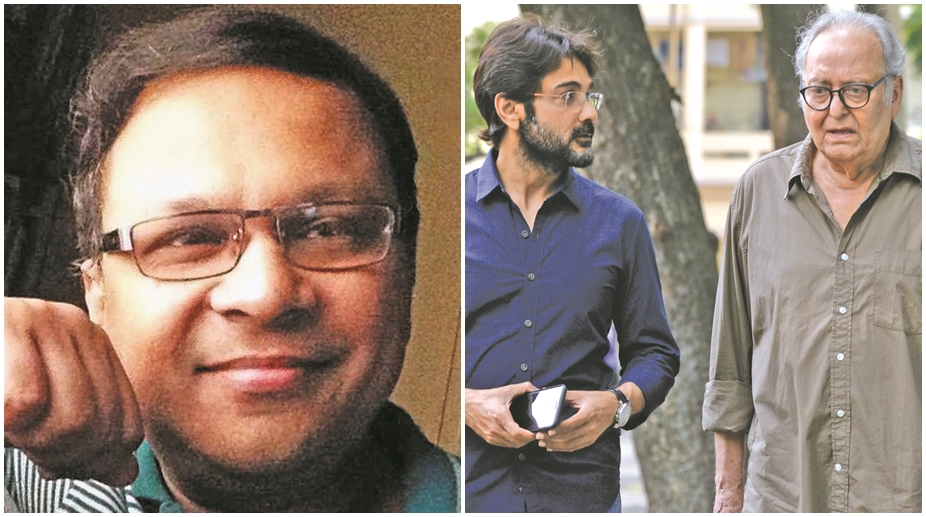Atanu Ghosh’s ‘Robibaar’ is a Cinematic Herbarium of Unjaded Romance
A tribute to Atanu Ghosh, a maestro of sensitive filmmaking, on his birth anniversary through his masterpiece 'Robibaar'
Director Atanu Ghosh gets candid on casting Soumitra Chatterjee and Prosenjit Chatterjee as father and son in his upcoming drama, Mayurakshi

Atanu Ghosh
Filmmaker Atanu Ghosh who has presented us with original and unique storylines through his feature films after graduating from telefilms of a different genre has now taken on the challenge of casting two stalwarts of Bengali cinema — Soumitra Chatterjee and Prosenjit Chatterjee as father and son in his latest film Mayurakshi. What is the film all about and what has been his experience of working with Prosenjit for the first time? Excerpts from an interview:
The name of the film is Mayurakshi and then within brackets, is written ‘the stream within’. One is the name of a river that has a virulent mood and the other is metaphorical.
The title is both a characteristic and a metaphor. First, the central plot of the story has contrasting connotations of being quiet and calm at one point of time and violently critical at another, which is synonymous with the nature of the river, Mayurakshi. Second, this ebb and flow also serves as an undercurrent of the theme. “The stream within” is a metaphor.
Advertisement
Though the story is focused on a father who is slowly moving into a state of dementia and his son is a middle-aged NRI, it addresses larger issues of relationships.
As the story focuses only on a few days (five days, to be precise), it deals with a single pivotal issue. This crisis is born out of the son’s relationship with his 84-year-old father, who is suffering from dementia and other neurological disorders. The matter turns out to be of utmost concern for the son, and he has to find a solution before he is scheduled to go back to the US. The focus is single and central, but the film explores a wider spectrum of issues, which includes the changing mode of relationships among others.
Advertisement
You have several women characters which offer small subplots for the larger story but also weave themselves into the main story. Who are they?
Sahana (Indrani Halder) is Aryanil’s childhood friend. They bump into each other after quite a few years, but as it seems, they have the kind of relationship where you tend to pick up from where you left. Sahana is Aryanil’s listening chamber. To her, he unveils his most intimate emotions. Married to a rich businessman, Sahana is happy and content on the surface with a teenaged daughter.
Mallika (Sudipta Chakraborty) is the housekeeper — the kind we come across rather frequently nowadays in India, with children engaging them to look after aged parents. She is enlightened, responsible and aided with some experience in geriatric care.
Just when Aryanil is facing a crisis that leaves him bewildered, he meets a stranger, Paromita (Gargee Roychowdhury), a strong woman with a mind of her own. Her encounter with Aryanil is unsettling and she stirs up Aryanil’s inner self, giving the plot quite an unexpected twist.
He is my greatest inspiration to explore life and the art of acting. He is always there to fuel my imagination. I love interacting with him. We share a brilliant chemistry. He has often said, “I have worked with Atanu so many times that I can read him or his writing so easily that I can take it almost blindfolded!” He is always eager to break out of what he has done. He wants to explore and stretch his limits as an actor. And this remarkable quality encourages me to go back to him time and again.
It has been a remarkable experience. I worked for his production house in a few projects. I was attracted to his enviable discipline, dedication and profound passion for the medium. Working with him for the first time, I relied on his deep sensitivity and grasp of the technicalities of filmmaking. The effort he puts in to improve his performance is exemplary. It is commonly said that a director should bring out the best from an actor. Prosenjit Chatterjee’s involvement encouraged me to go all out for the character he plays in the film.
When you watch the film, you will find the actors blend naturally with the look, feel and psyche of the characters. That is why I selected them. Besides, I enjoy working with powerhouse performers because I am fussy about three things — script, acting and editing! Mayurakshi relies on a very natural spontaneous acting form, which does not conform to any filmy format.
All films are memorable in one way or other. Actually, over time when audience enthusiasm lessens, the exuberance of people associated with it dampens down, and only then the director stands by his films quite like his children. He simply cannot disown or discard them. Gradually, he develops a deep sense of bonding and empathy for them, even when they look archaic, immature or full of follies in later years. That is something I have realised over the years.
No one is better suited than Debojyoti Mishra when you are dealing with the subtle nuances of emotion, its complexities and its various hues and shades. Music provides the spectrum and the objective was to go beyond the limits of visual and narrative exploration. And I believe Debu da has done justice to that brilliantly.
Advertisement